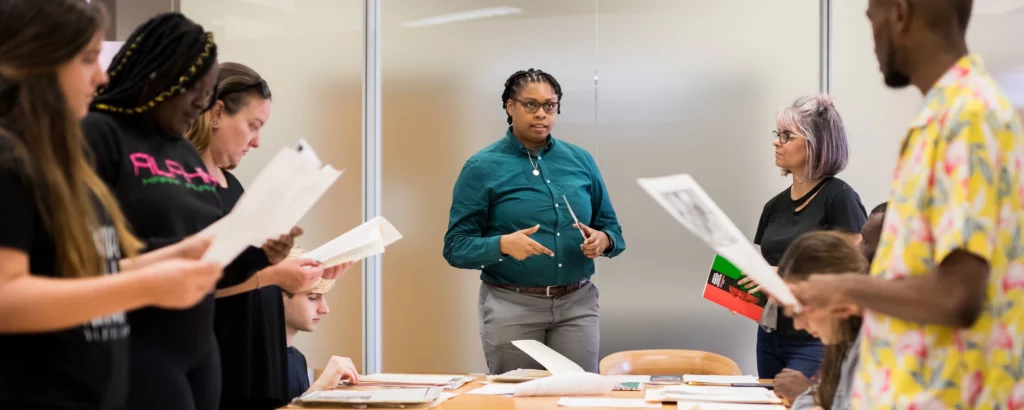Critical Race and Ethnic Studies courses go beyond the traditional pedagogy of race and ethnic studies, which tend to essentialize and compartmentalize racial and ethnic categories without acknowledging the historical fluidity, contestation, and permeability of human group formations. These courses are closely related to The Department of Sociology’s other specialty subject matters of criminology, political economy, and environment by focusing on conceptual overlap with these areas. Race and ethnicity are always constructed in relation to specific historical and politico-economic contexts, but racial logics shift over time and between geographies creating a multiplicity of racial and ethnic material outcomes and meanings. Thus, macro and micro level variation and change are central themes across courses, as is hierarchy. Courses address questions of power through the study of structural racism, social/national movements, and social (in)justice. Practically, courses in the area equip students with rigorous theoretical and analytical tools to enable increased understanding of a multicultural and multinational world for the sake of furthering social justice, human rights, and egalitarian democracy. Social justice, as a guiding principle of the Department of Sociology, is at the foundation of our scholarship and pedagogy on critical race and ethnic studies, as we encourage our students to imagine and create transformative change for racial equality.
Undergraduates majoring or minoring in Sociology may earn the concentration in Critical Race and Ethnic Studies. Graduate students earning MA or Ph.D. degrees in Sociology may likewise choose a Critical Race and Ethnic Studies concentration.
Click on the section below to view courses and descriptions.
Core Undergraduate Courses
225 Introduction to Critical Race and Ethnic Studies
This class will introduce a basic conceptualization of race and ethnicity and racial inequality from a U.S. and global perspective. It will be interactive and utilize social media and center on contemporary events connected to race and sociology. Examples of contemporary event ideas include: Jordan Davis killing; race in 2016 presidential election; Syrian refugee backlash; Pop singers, pop culture gender and race; international events, etc.
343 Race and Ethnicity in the United States
This class is currently within our course offerings and is taught as an advanced introductory course. The class is geared toward the United States and provides an overview of sociological race theories and the comparative histories of different ethnic and racial groups in the United States.
452 Race, Ethnicity, Crime and Justice
This class is currently in our course offerings and examines racial/ethnic disparities in criminal offending and victimization, as well as different experiences with law enforcement, judicial, and correctional agencies. Emphasis on social justice.
460 Global Capitalism and Racism
This class connects the emergence of modernity and global capitalism to the idea of race and the proliferation of racism. Post-colonial theory, world-systems, and commodity chain analyses will be taught with a racial and gender focus. A series of industry and country case studies is explored to examine how historical and contemporary racial divisions of labor emerge.
466 Special Topics in Race and Ethnicity
Examples include: environmental racism, policing and race, race terror and genocide, intersectionality, health disparities, immigration and ethnic change, disproportionate minority contact, advanced Critical Race Theories, etc.
472 Civil Rights Movements
This class is currently in our course offerings and focuses on the origins and development of the civil rights movement throughout the 20th century, with special emphasis on civil rights litigation of the 1930s-1950s and key events of the years 1954-1965. Attention will also be given to the Chicano Movement and American Indian Movements. Writing-emphasis course.
Core Graduate Courses
509 Critical Race and Sociological Foundations of Race and Ethnicity
This class provides a historical and contemporary overview of race scholarship in the United States that focuses on the most important race scholars and scholarship over the last century. Students will see the evolution of race scholarship from Du Bois, to the Chicago School, to urban sociology, to contemporary theories on racial formations, systemic racism, color-blind racism, and critical race theory. The important canonical books in race scholarship will be positioned and interrogated along with addressing where race scholarship is heading in the twenty-first century, in particular the influence of CRT as a movement in Legal studies that has since expanded into several other academic disciplines.
552 Race, Ethnicity, Crime and Justice
Examines racial/ethnic disparities in criminal offending and victimization, as well as different experiences with law enforcement, judicial, and correctional agencies. Emphasis on social justice.
616 Advanced Topics in Race and Ethnicity
Examples include: environmental racism, policing and race, race terror and genocide, intersectionality, health disparities, immigration and ethnic change, disproportionate minority contact, advanced Critical Race Theories, etc.
694 Global Racism
This course explores how the idea of race emerged globally and how sociological and interdisciplinary race scholars theoretically position race in different geographies with special attention given to Latin America, Africa, Asia, the Middle East and the United States.
The Sociology Faculty in Critical Race and Ethnic Studies
- Stephanie A. Bohon, Professor and Department Head
social and applied demography, new destination immigration, Latino migration, ethnic economies, and immigrant incorporation/adaptation - Michelle Christian, Associate Professor
critical race and racism, global political economy, labor - Meghan Conley, Assistant Professor of Practice and Director of Community Partnerships
immigration; Latinx migration; participatory action research; social movements - Shaneda Destine, Assistant Professor
race, class, and gender; Black social movements; intersectionality; critical race and political economy - Asafa Jalata, Professor
political economy, global studies/world-systems, race and ethnicity, sociology of development, globalization and social movements, terrorism studies, human rights, and Africana studies - Sam Kendrick, Assistant Professor
gender and sexuality; courtship and marriage; sexual scripts; cultural studies; gender inequality at the intersections of race and class - Andrew Taeho Kim, Assistant Professor
labor markets; stratification and inequality; race and ethnicity; Asian American studies; gender; marriage and family; returns to education; research methods and statistics - Deadric Williams, Associate Professor
race & racism, Black families, poverty & material hardship, stress & health, quantitative methods (longitudinal and dyadic analyses)
